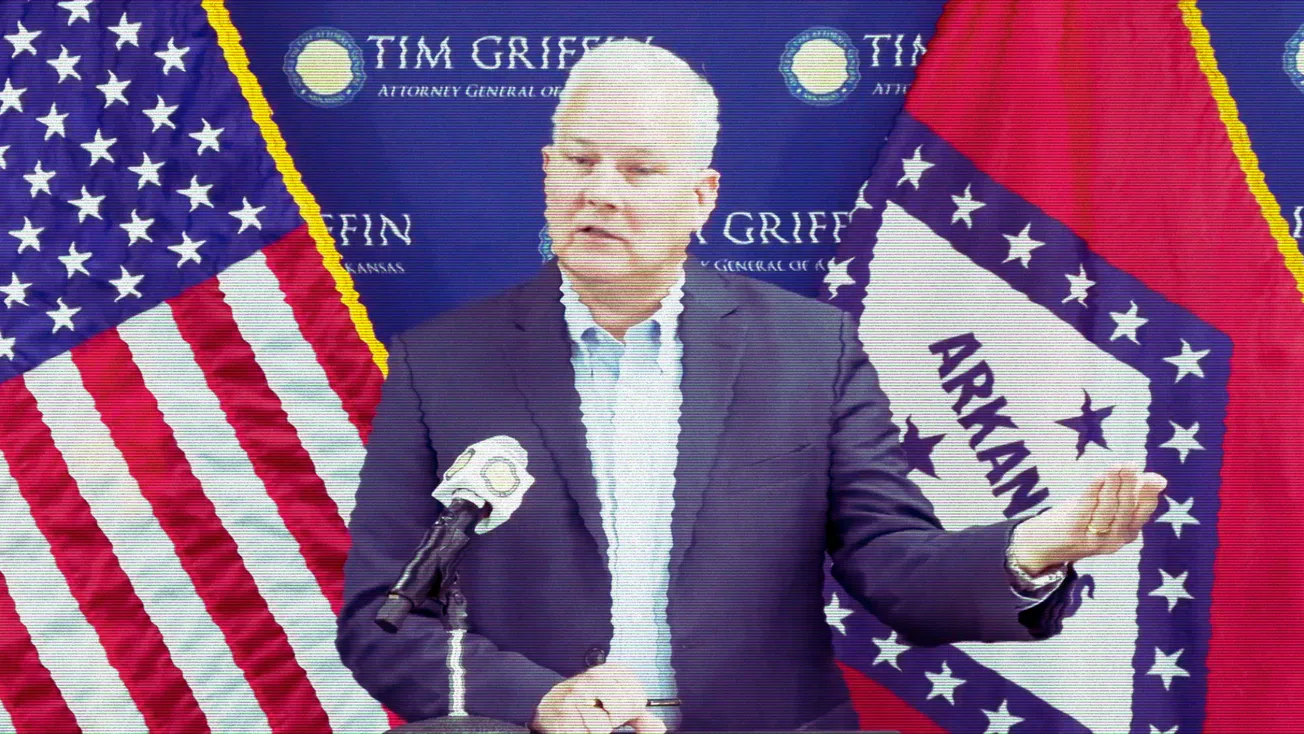Arkansas Attorney General Tim Griffin (R) sent cease and desist letters on Tuesday to two websites that provide information about abortion pills, demanding they stop “advertising” that medications can be mailed to Arkansas, which has a total abortion ban. The letters came on the same day that Griffin and 15 other Republican AGs called on Congress to consider legislation to ban so-called “shield laws” that allow healthcare providers to prescribe abortion pills across state lines. About one in four abortions in the U.S. are done via telemedicine, and 12,000 abortions per month are provided by clinicians prescribing under shield laws.
Griffin is targeting the sites Plan C and Mayday Health, which do not prescribe or sell the drugs mifepristone or misoprostol—as some local news reports suggested—but rather inform people about where they can find the pills. (Plan C is well known in the reproductive rights world and, in the days following Donald Trump’s November victory, the site experienced a 625% increase in traffic.) Griffin sent letters to the sites’ parent companies Possibility Labs and Mayday Medicines Inc. in which he alleges that, by referring to abortion pills as safe, the language on the sites “may constitute false, deceptive, and unconscionable trade practices” under the Arkansas Deceptive Trade Practices Act (ADTPA).
More than 100 studies have shown medication abortion to be safe and effective for ending a pregnancy, but Griffin cites a paper from the far-right Ethics and Public Policy Center which suggests abortion pills result in higher complication rates than what’s printed on the drug label. The paper is methodologically flawed and was not published in a peer-reviewed journal, but conservatives have nonetheless rallied around it to try and pressure the Food and Drug Administration to restrict access to the drugs—especially by ending telemedicine prescriptions. EPPC president Ryan Anderson argued on a private Zoom call reported by Politico that requiring in-person appointments would align with Trump’s stated desire to leave abortion policy to the states because, he said, “You’re not leaving it to states if California can mail pills to Texas.”
Griffin is asking the sites to cease and desist “from conducting any advertising related to the delivery of abortion drugs into the State of Arkansas” within 14 days of the letter, or face investigations and potential lawsuits under the ADTPA. The letters warn that if such lawsuits were successful, “you may face civil penalties up to $10,000 per violation.”
Autonomy News contacted both sites for comment on the letters. Plan C declined to comment and Mayday did not respond by publication time.
Mary Ziegler, a professor at the UC Davis School of Law and an expert on reproductive rights law, called Griffin’s cease and desist letters a “little bit puzzling.” She told Autonomy News that, typically, deceptive trade practices laws are meant to protect consumers paying for goods and services from fraud and other unethical marketplace conduct. The laws generally govern purchases, not information. “I'm assuming maybe the point is just to create a chilling effect,” Ziegler said “There may be First Amendment questions that come up there.”
Griffin previously sent ADTPA cease and desist letters to two other entities for allegedly sending pills to Arkansans or giving them to residents to bring back to the state. The May 2024 letters were sent to shield law provider Aid Access, and to a New York City abortion clinic that doesn’t offer telehealth prescriptions, but merely advertises that Arkansas residents can travel to the clinic for care. It does not appear that Griffin has pursued legal action against either organization.
More recently, Missouri AG Andrew Bailey (R) filed a lawsuit against Planned Parenthood Federation of America—but not the two Planned Parenthood affiliates actually providing health services in the state—over its safety claims about abortion pills. Specifically, Bailey argues Planned Parenthood’s claim that abortion pills are safer than Tylenol is a violation of the Missouri Merchandising Practices Act. He cites a different anti-abortion study purporting to debunk that comparison from the Charlotte Lozier Institute, the “research” arm of Susan B. Anthony Pro-Life America. (SBA touted the suit in a press release.) Bailey’s suit also seems to refer to the EPPC study, but he doesn’t cite it directly.
While Ziegler said this suit is by no means a slam dunk, it's “less of a head scratcher” than the lawsuit threats from Griffin.
As for the letter that 16 AGs sent to Congress asking them to prevent pills from being shipped to states with bans, Ziegler said it was “really baffling in a lot of ways.” That’s because the “dominant position” conservatives have been taking is that Congress doesn’t need any new laws to ban the mailing of pills, thanks to an 1873 anti-obscenity law called the Comstock Act, which is still on the books. (Project 2025 implored the next Republican president to enforce the dormant law to end telemedicine abortions.)
Multiple AGs who have argued in court and other forums that Comstock bans the mailing of abortion pills signed this letter, including Bailey, Idaho AG Raúl Labrador, Kansas AG Kris Kobach, and Texas AG Ken Paxton. “Asking Congress to give you a law preempting shield laws like that makes a lot of sense, it's just kind of shocking to see them concede they need one,” she said. “It's a weird thing to do, because it doesn't help their litigation position with the Comstock Act.”
Taken together, the letters the AGs sent this week suggest that the Trump administration is moving too slowly for them on abortion pills, Ziegler said.
“There has obviously been a realization on the part of conservative Attorneys General that the mailing of abortion pills [and] shield laws have been a disaster for the anti-abortion movement,” she said, adding that “it seems equally clear that the FDA and Congress are not doing what [conservative] people want on mifepristone.” The AGs appear to be looking for other ways to shut down the mailing of pills on the assumption that they won't get any cooperation from the federal government—or that such cooperation will come later than they’d like, she said.
Others in the movement have even less patience: The first known test of shield laws filed in federal court came not from an elected official, but from anti-abortion activist and former Texas Solicitor General Jonathan Mitchell. In July, he filed a wrongful death lawsuit against a California doctor for allegedly providing abortion pills to the girlfriend of a Texas man. Mitchell is “taking it out of the hands of the AGs because they're taking too long,” Ziegler said. He has a history of doing this, most notably by writing the Texas law that effectively banned abortion there months before the Supreme Court overturned Roe v. Wade. (As in this case, Mitchell’s legal strategy on abortion pills includes recruiting aggrieved men upset about their partners’ abortions.)
Ziegler said pressure from activists and politicians could compel the Trump administration to take more aggressive action. She said both groups probably realize that the administration “doesn't exist in a vacuum,” so if there were “a federal court decision saying mifepristone isn't safe, or saying the Comstock Act is a ban, that might force the Trump administration to act in a way that just asking nicely has not.”
A sprint to crack down on abortion pills has begun, and now we wait to see which group crosses the finish line first.
This story was edited by Garnet Henderson and copy edited and fact checked by Hannah Rappleye.









